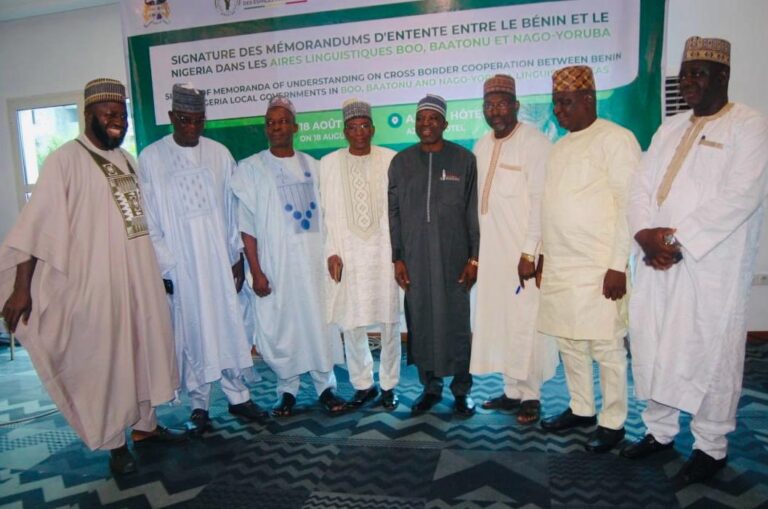By Peter Omopo
Nigeria and the Republic of Benin have signed a Memorandum of Understanding (MoU) to deepen collaboration between local governments and traditional authorities along their shared borders.
The agreement, signed on August 18, 2025, aligns with the African Union Convention on Cross-Border Cooperation, ECOWAS initiatives, and the Nigeria–Benin Cross-Border Cooperation Agreement.
According to a statement by the Head of Information and Public Relations at the National Boundary Commission (NBC), Efe Ovuakporie, on Friday, the MoU provides a framework for cooperation between Nigeria’s border local government areas and Benin’s communes, as well as traditional rulers from both countries.
The initiative is designed to combat cross-border crimes, revive cultural ties fractured by colonial boundaries, and foster grassroots-driven development.
NBC Director-General, Adamu Adaji, who led Nigeria’s delegation to the signing ceremony, described the pact as a practical tool to address the daily realities of border communities.
“This is not just a document. It is a pledge to our people that we will work together, across borders, to build safer, stronger, and more prosperous communities,” Adaji said, stressing the Federal Government’s commitment to turning the agreement into tangible benefits.
The MoU also supports progress in the delimitation and demarcation of the Nigeria–Benin boundary, with local leaders and traditional rulers expected to play key roles in preventing disputes and promoting peaceful coexistence.
Chairman of Baruten Local Government Area in Kwara State, Idris Mohammed, speaking on behalf of Nigeria’s border LGAs, welcomed the development. “Our people have lived with insecurity, disrupted trade, and cultural isolation for too long. This agreement places their concerns at the centre of bilateral cooperation,” he said.
From the Beninese side, the Mayor of Malanville Commune, Joseph Ahoyo, commended the initiative for giving local communities a direct voice in cross-border policy. “This MoU is unique because it empowers communes and traditional authorities to play an active role in shaping the future of our shared border,” he noted.
Traditional rulers were also recognised as essential actors in the agreement, leveraging their historical roles as custodians of kinship and mediators in community disputes.
Beyond security, the MoU highlights economic opportunities for joint initiatives in trade, agriculture, infrastructure, and cultural exchange to improve livelihoods and strengthen regional integration in line with ECOWAS objectives.
Nigeria’s delegation included representatives from the Federal Ministries of Foreign Affairs and Justice, senior NBC officials, and chairmen of border states—Kebbi, Niger, Kwara, Oyo, Ogun, and Lagos—supported by the Nigerian Embassy in Cotonou.
Officials from both countries confirmed that implementation will begin immediately, with joint dialogue platforms and pilot programmes planned in security cooperation, economic development, and cultural revival.

